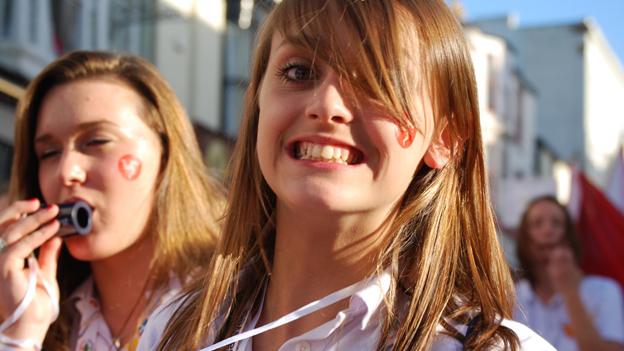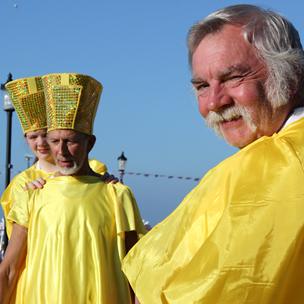Island Games: A mini Olympics for the disenfranchised
- Published

"It took us 12 days to get here from St Helena because we don't have an airport on the island."
A mammoth journey from the South Atlantic to the Isle of Wight for Dax Richards and the team he manages but one which he says was worth the effort to take part in this year's week-long Island Games, external.
"We really do relish the chance to come across and compete in an international sporting event because we don't get too many opportunities to do that in St Helena."
Fifteen islands competed at the first Games on the Isle of Man in 1985. Now 3,500 athletes are drawn from 24 islands; from the British Isles, the Caribbean, the Mediterranean and others from obscure Scandinavian isles known as Hitra, Gotland, Saaremaa and Froya.
Not one of the islands is politically independent and as such the biennial event is a mini-Olympics for the disenfranchised.
Sark has world class sportsmen but during the Commonwealth Games they represent the bailiwick of Guernsey and competitors at an Olympic level would do so under the flag of Great Britain and Northern Ireland, so the Island Games offers athletes a rare chance to represent their home.
"There's never a prouder moment than when you see your local flag being hoisted up behind you on the podium. It really does bring a lump to your throat sometimes," says shooter Nicholas Dewe from the channel island that only has around 650 inhabitants.
The Games open with a two-hour carnival of sound and colour that winds through the Victorian streets of Ryde. Flanked by thousands of local onlookers, many of the young athletes that follow the main procession look on with bemusement and apprehension, clearly unnerved by the attention.
Most are by no means elite athletes, they may only be among the best athletes from their school. And some are wizened veterans who return every two years to revisit old friendships forged in the cauldron of competition.
As Lord Coe, Chairman of the London Organising Committee of the London Olympics (Locog), explains, the Island Games are also known as the "friendly games".
"When you bring communities together and you bring them from different cultures and different languages and different backgrounds, there is one language we all speak and that is sport," he says.
Global recession
Although many of the islanders here feel proud that they are slightly disconnected from their national centres of political power, no island has avoided the negative impacts of a global recession.

Warming up ahead of the opening ceremony
"In times of crisis, challenges and success stories are more important than ever," says Jorgen Petterson. He is Chairman of the International Island Games Association (IIGA) and is only too aware that in times of economic hardship, the peripheries of a nation often suffer the most.
One island that is struggling is St Helena. Positioned in the South Atlantic Ocean, 1,200 miles from Africa's west coast, it is one of the most remote islands in the world.
It is a British overseas territory and the islanders' only conduit to the outside world is via a five-day journey on one of the world's last working Royal Mail ships.
On a sun-drenched yet wind-battered golf course that slips into the English Channel, Dax Richards explains that; "the main breadwinners of the island are migrating to the neighbouring island of Ascension or onwards to the Falklands".
Nevertheless, just by attending the Island Games, Dax believes that changes can be made.
"For us it's more about giving exposure to St Helena as well as actually taking part in the sporting event. I'm hoping we're going to get an airport from the British government," he says.
Divided loyalties
St Helena's loyalties to the motherland are very strong but for the island of Aland, things are not so cut and dry.
"It's pretty complicated. We speak Swedish and most of our holidays and stuff like that is from Sweden but we belong to Finland," says Lukas Mattson, a student competing for the first time.
There may be divided national loyalties for some but many islanders here do share a common sense of identity - that of being an island inhabitant.
"As islanders you know in order to achieve something you have do it yourself or at least together with team-mates willing to try as hard as yourself," Jorgen Petterson, head of the Island Games, tells participants at the opening ceremony.
Ola Granule, a teacher to 245 children by day, is a veteran of the Island Games. He is a table tennis player and he has been to every single one. He agrees that islanders share a mindset: "The islanders are the same, in mind, you know. More patient, a little bit slower tempo in lifestyle".
Olympic veteran
Although Ola has not reached the upper echelons of his sport, one team-mate has - Mattias Sunneborn, a long jumper who competed at the Atlanta and Sydney Olympics and who holds the Swedish record.
At the Fairway Athletics Centre, the former Olympian looks focused, leaning over a wire fence that separates spectators and competitors. He cuts a solitary figure detached from the mass of athletes in blazing team colours that have huddled behind one end of the running track.
"It's an amazing stepping stone to bigger competitions but I keep competing at the Island Games because I am from Gotland," Sunneborn says.
His best years are long gone and yet Mattias admits that he still hungers to compete. He is a long jumper but this year he is attempting the 400m hurdles for the first time.
In contrast, others come off the track beaming, regardless of how well they have performed.
"It went kind of bad, I messed up, I didn't do well in the start but it's great here, it's beautiful," says Greete Vapper, a young woman from the Estonian island of Saaremaa.
Inevitably, the Island Games provides a unique forum for communities without a voice to express their local sense of identity. But it also brings together isolated peoples who can compare how they live in order to reaffirm their place in the world. And all this is irrespective of whether they compete on an equal playing field or not.
There are not many major sporting events where a father finds himself pitted against his son in sailing and school champions take on former Olympians on the track.
- Published4 July 2011